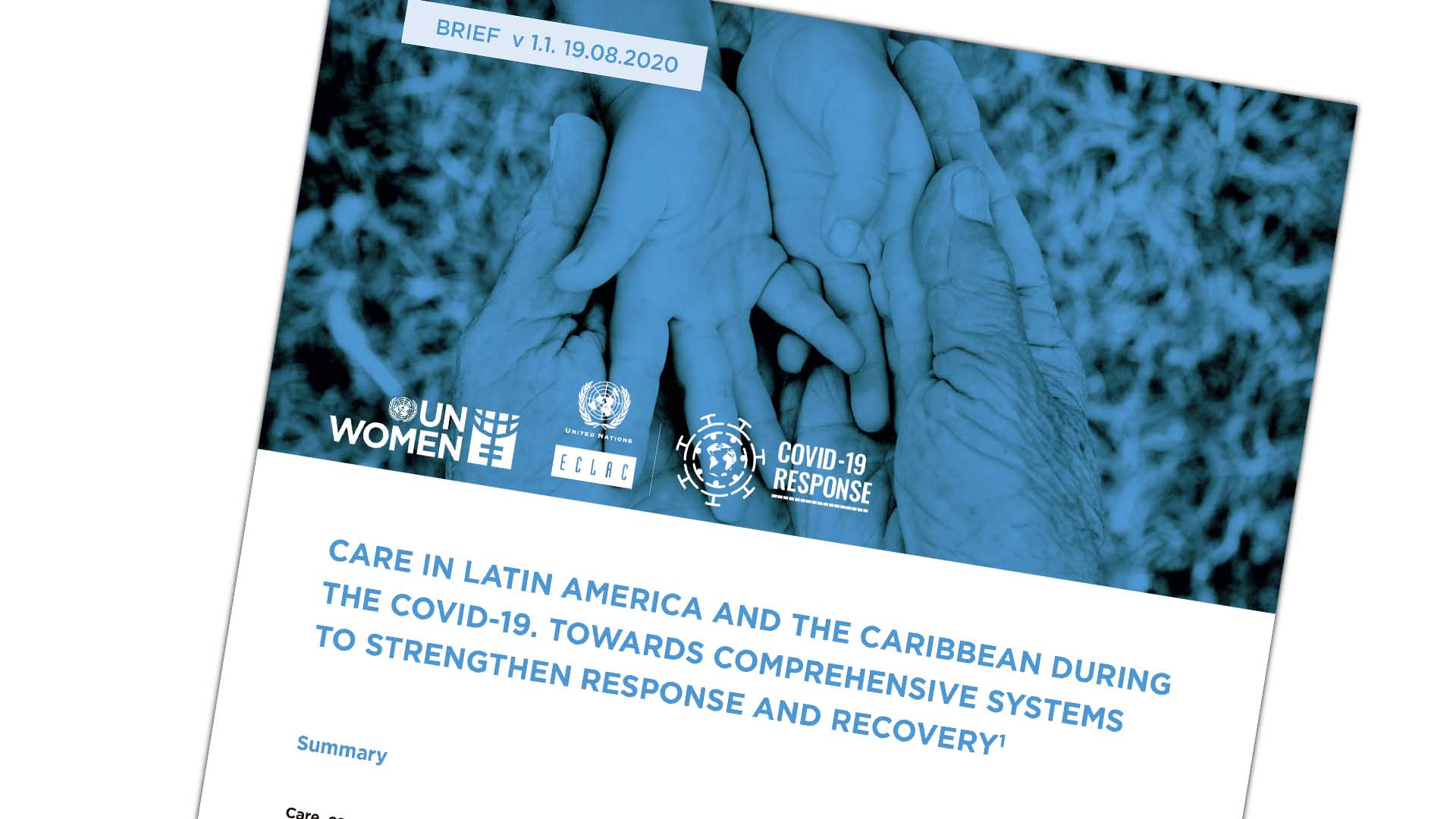ECLAC and UN Women: Comprehensive Care Systems are Key to the Socioeconomic Recovery in Latin America and the Caribbean
Work area(s)
The Executive Secretary of the Economic Commission, Alicia Bárcena, and the Regional Director of UN Women, María Noel Vaeza, presented a joint document entitled Care in Latin America and the Caribbean during the COVID-19.

The Economic Commission for Latin America and the Caribbean (ECLAC) and the United Nations Entity for Gender Equality and the Empowerment of Women (UN Women) called for governments in the region to put care at the center of their responses to COVID-19, by creating incentive and recovery packages, promoting comprehensive systems that ensure access to care for people who need it, and guaranteeing the rights of the people who provide it.
Comprehensive care systems can become a real driver of the region’s socioeconomic recovery which leaves no one behind, Alicia Bárcena, ECLAC’s Executive Secretary, and María Noel Vaeza, Regional Director of UN Women for the Americas and the Caribbean, emphasized during the launch of the document Care in Latin America and the Caribbean during the COVID-19. Towards comprehensive systems to strengthen response and recovery, held on August 19 during a webinar that featured the participation of numerous authorities from the region.
“The COVID-19 crisis must be transformed into an opportunity to strengthen care policies in the region, using a systemic and comprehensive approach. This means incorporating all the populations that need care and generating synergy with economic, employment, health, education and social protection policies, on the basis of promoting social and gender co-responsibility. This is the only way to successfully face the diverse consequences and economic and social impacts caused by the pandemic, and to build back with greater equality, leaving no one behind,” Alicia Bárcena stressed.
“This crisis is exceptional and demands profound changes and the expansion of social protection, which entails new social contracts. It is time to take public investment in health and job creation with a gender and rights-based approach seriously. Investment in care policies generates a triple dividend since, in addition to contributing to people’s well-being, it enables the direct and indirect creation of quality employment and facilitates women’s participation in the workforce, which leads to revenue returning to the State via taxes and contributions and to greater income for people. If governments do not take seriously the need to strengthen care systems with co-responsibility, this crisis may leave many women out of the economy and unable to exercise their economic and social rights,” María Noel Vaeza stated.
In addition to analyzing the importance of care systems in the region, the report raises the visibility of the effects that the pandemic has had in this area, along with the measures implemented in the framework of the response to COVID-19 in some countries, and it offers a series of policy recommendations to address the care crisis in the current context.
The COVID-19 pandemic has reaffirmed the centrality of care, demonstrating the unsustainability of its current distribution, ECLAC and UN Women indicate. Since before the pandemic, women in Latin America and the Caribbean have dedicated triple the time that men do to unpaid care work. According to the document, this situation has been aggravated by the rising demand for care and the reduced supply of services caused by the confinement and social distancing measures that have been adopted.
The pandemic’s effects on people’s lives create new challenges for reorganizing productive and reproductive work in the short, medium and long term, and they will entail new demands on national public education, health and social protection systems, beyond the crisis, ECLAC and UN Women underscore.
The recommendations made by the two organizations include measures such as ensuring that care services are considered to be a priority, making sure they can be carried out safely during periods of confinement; expanding the protection of people who perform both paid and unpaid care work; investing in care infrastructure and in technology and transport systems that save time; and integrating the care economy into the planning, design and implementation of macroeconomic policies, among others.
In the document, ECLAC and UN Women propose conducting rapid data gathering on the impacts of COVID-19 on unpaid care work, as well as ensuring the functioning of childcare services and care services for older adults and people with disabilities; providing more flexible conditions for access to bonuses and subsidies to access care services; promoting the business sector’s co-responsibility during lockdown; leading campaigns to raise the visibility of the heavy care burden on women; and systematically incorporating working groups on care policies into the crisis committees created in the context of the pandemic.
For queries and to arrange interviews:
- ECLAC’s Public Information Unit.
Email: prensa@cepal.org; Telephone: (56) 22210 2040.
- UN Women’s Regional Office for the Americas and the Caribbean.
Email: pamela.ogando@unwomen.org; WhatsApp: +301 648 8026
ECLAC’s social media: Twitter, Facebook, Flickr and YouTube
UN Women’s social media: Twitter, Facebook, Instagram and YouTube
Related content
Care in Latin America and the Caribbean during the COVID-19. Towards comprehensive systems to strengthen response and recovery
Presentation by Alicia Bárcena, Executive Secretary of ECLAC, during the launch of joint publication with UN Women.

Related link(s)
Country(ies)
- Latin America and the Caribbean
Contact
Public Information Unit
- prensa@cepal.org
- (56 2) 2210 2040
